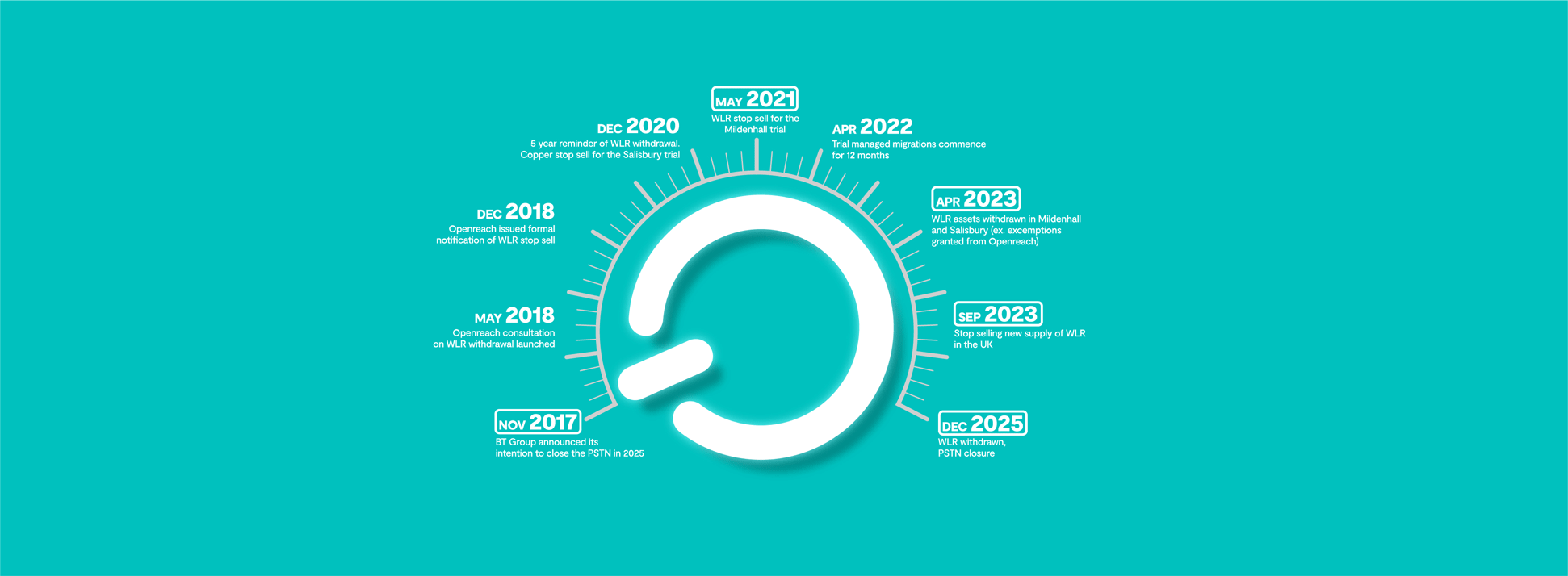
What is the ISDN Switch Off 2025?
The UK copper line switch-off (also known as the ISDN Switch Off or Great British Switch Off here at Zen) is the official end of the analogue phone or copper line infrastructure. When it takes place, traditional PSTN and ISDN lines will stop working altogether, to be replaced by IP phone systems like Digital Voice and CloudComms. The stop sell has already happened across many telephone exchanges and the switch off itself will happen in 2025.
The UK’s copper wire telephone system (also known as PSTN or the Public Switched Telephone Network) has been relatively unchanged for more than 100 years. In an increasingly connected world, demand for digital connectivity is rising. Ultimately the ISDN switch-off in 2025 will improve the quality of communications nationwide as the country transitions away from copper lines to more reliable FTTP or full fibre connectivity.
If you haven’t already done so, it is time you future-proof your home and business against the disconnection of ISDN and PSTN telephone services. Find out when and how to make this essential update, and stay connected for the future.

Don’t get left behind – trust Zen to guide you through the 2025 Switch Off.
Discover how Zen can help you as a:
The ISDN Switch Off: key dates

How Zen can help you?
Access to reliable communications to connect with friends, family, colleagues, customers, and suppliers will always be essential. As ISDN and PSTN lines become a part of history, make sure you’re equipped for the future of communications with the analogue switch-off coming in 2025.
We’ve found that most businesses still use landlines for:
Supplier and Partner communications (61%)
Colleague communications (62%)
Don’t get caught out continuing to pay for analogue telephone contracts that tie your business in well beyond the switch-off date. They’ll either leave you disconnected or out of pocket from 2025. Future-proof your personal and business communications with Zen.
Discover how Zen can help you as a:
Residential users and small businesses
Zen Full Fibre
Our Full Fibre package offers a true fibre to the premises (FTTP) broadband connection. It is capable of providing both WiFi and Digital Voice connections, so you can keep your business online and your home connected.


Single Order Generic Ethernet Access (SoGEA)
If your business is already using voice technology such as Voice over Internet Protocol (VoIP) or Session Initiation Protocol (SIP), SoGEA might be the option for you. When full fibre isn’t available, with SoGEA you can order an FTTC internet connection without the need for a phone line, combining all your services into one handy order.
Digital Voice
Still using your landline or ISDN network? Digital Voice is the future-proof solution for making and receiving calls over your internet connection. It’s high quality, reliable, and doesn’t depend on those old copper telephone wires. Just plug your phone into your router and you’re ready to go.

Mid-market & Corporate businesses
VoIP systems like Digital Voice aren't the only solution for large or growing businesses. Experience clear-as-day audio and video calling to colleagues and customers with CloudComms by Zen. We provide flexible and cost-effective business communication services to suit your budget and needs. Be confident in the connectivity for your business with 24/7 management and monitoring.
✔ Connectivity from anywhere
Ensure maximum business comms continuity with guaranteed 99.99% uptime. CloudComms allows you to answer your business number on any device and provides automatic call rerouting – making working from home a breeze.
✔ Pass on the benefits to your customers
Enjoy greater efficiency when responding to customer queries, whatever channel they come through. With seamless integration across departments and communication channels, your customers will be more than satisfied with your service.
✔ Seamless management
Use our 24/7 portal access to add and remove users, access call logs and recordings, and change permissions. With Zen CloudComms, your business communications are exactly that – your business.
✔ Easy integration
Discover a streamlined solution. CloudComms is designed to integrate with your existing communication systems for ease of set-up. From the office to the call centre, to the home office – all your business communications are unified with Zen.
Partners
✔ Network and connectivity
Choose from a range of broadband, ethernet leased lines and MPLS IP VPN options to suit the usage and connectivity needs of your business.
✔ Cloud and hosting
Make your customers’ cloud transition as smooth as possible with IaaS, Baas, and DRaaS services for efficient and secure data management.
✔ Voice
With competitively priced business phone lines and cost-saving hosted voice, Zen guarantees to keep your business talking.
Resources
The Great British Switch Off: What it is and why it's happening
When we talk about the impending switch off of analogue (PSTN and ISDN) telephone services, it’s easy to make the assumption that businesses are fully prepared.
However, our own research indicates that, for example, 17% of large businesses are unaware that PSTN and ISDN products will no longer be sold from 2023.
Furthermore, a number of businesses that are aware of the stop sell are currently unsure about their next steps.
It seems then that awareness is still a significant issue. The good news is that we’re still nearly three years away from the September 2023 stop sell date, with end of life taking place in late 2025. And that means businesses still have plenty of time to ensure they’re fully prepared for the transition.
What is it?
As existing legacy infrastructure becomes more restrictive and costly to maintain, traditional telephony is being withdrawn to make way for a system that will rely on data connections.
As broadband has evolved from almost entirely copper-based to largely, and increasingly, dependent on fibre, so too has its reliability and performance. In the meantime, copper-based telephony services have remained largely unchanged over a number of years.
But as full fibre becomes more and more ubiquitous, the ability to integrate voice communications into our broadband networks becomes a natural choice, and one that will enable a step change in performance and the availability of more powerful voice services.
Proper preparation, etc.
Naturally, you’ll have existing contracts that need to be navigated. This advance notice of switch off gives businesses the opportunity to think about their next deal, to ensure they’re not left with suboptimal legacy systems when the time comes.
And when we consider that most of the businesses (72%) we surveyed use telephony for customer communications, it’s clearly still a big deal.
But those customer (and internal, and supplier) communications could be so much better.

Flexible and remote
These two words are key to understanding how the Great British Switch Off can be seen as a real business opportunity.
With reliable, high performance data connections comes the possibility of new types of communication, like cloud comms, that could transform the way we communicate.
2020 was the year remote working went mainstream, and many of the businesses we’ve asked plan to keep it that way. But remote working brings challenges: connectivity of course, but also effective communication.
Future-proof communication services promise to transform the way we do business with our customers and each other. And that’s where the Great British Switch Off, while potentially daunting in its premise, can provide the impetus for significant business transformation.
For an informal introduction to some of the things you need to start thinking about today, check out our podcast on the subject.
The Great British Switch Off: What it is and why it's happening
When we talk about the impending switch off of analogue (PSTN and ISDN) telephone services, it’s easy to make the assumption that businesses are fully prepared.
However, our own research indicates that, for example, 17% of large businesses are unaware that PSTN and ISDN products will no longer be sold from 2023.
Furthermore, a number of businesses that are aware of the stop sell are currently unsure about their next steps.
It seems then that awareness is still a significant issue. The good news is that we’re still nearly three years away from the September 2023 stop sell date, with end of life taking place in late 2025. And that means businesses still have plenty of time to ensure they’re fully prepared for the transition.
What is it?
As existing legacy infrastructure becomes more restrictive and costly to maintain, traditional telephony is being withdrawn to make way for a system that will rely on data connections.
As broadband has evolved from almost entirely copper-based to largely, and increasingly, dependent on fibre, so too has its reliability and performance. In the meantime, copper-based telephony services have remained largely unchanged over a number of years.
But as full fibre becomes more and more ubiquitous, the ability to integrate voice communications into our broadband networks becomes a natural choice, and one that will enable a step change in performance and the availability of more powerful voice services.
Proper preparation, etc.
Naturally, you’ll have existing contracts that need to be navigated. This advance notice of switch off gives businesses the opportunity to think about their next deal, to ensure they’re not left with suboptimal legacy systems when the time comes.
And when we consider that most of the businesses (72%) we surveyed use telephony for customer communications, it’s clearly still a big deal.
But those customer (and internal, and supplier) communications could be so much better.

Flexible and remote
These two words are key to understanding how the Great British Switch Off can be seen as a real business opportunity.
With reliable, high performance data connections comes the possibility of new types of communication, like cloud comms, that could transform the way we communicate.
2020 was the year remote working went mainstream, and many of the businesses we’ve asked plan to keep it that way. But remote working brings challenges: connectivity of course, but also effective communication.
Future-proof communication services promise to transform the way we do business with our customers and each other. And that’s where the Great British Switch Off, while potentially daunting in its premise, can provide the impetus for significant business transformation.
For an informal introduction to some of the things you need to start thinking about today, check out our podcast on the subject.
The Great British Switch Off: What it is and why it's happening
When we talk about the impending switch off of analogue (PSTN and ISDN) telephone services, it’s easy to make the assumption that businesses are fully prepared.
However, our own research indicates that, for example, 17% of large businesses are unaware that PSTN and ISDN products will no longer be sold from 2023.
Furthermore, a number of businesses that are aware of the stop sell are currently unsure about their next steps.
It seems then that awareness is still a significant issue. The good news is that we’re still nearly three years away from the September 2023 stop sell date, with end of life taking place in late 2025. And that means businesses still have plenty of time to ensure they’re fully prepared for the transition.
What is it?
As existing legacy infrastructure becomes more restrictive and costly to maintain, traditional telephony is being withdrawn to make way for a system that will rely on data connections.
As broadband has evolved from almost entirely copper-based to largely, and increasingly, dependent on fibre, so too has its reliability and performance. In the meantime, copper-based telephony services have remained largely unchanged over a number of years.
But as full fibre becomes more and more ubiquitous, the ability to integrate voice communications into our broadband networks becomes a natural choice, and one that will enable a step change in performance and the availability of more powerful voice services.
Proper preparation, etc.
Naturally, you’ll have existing contracts that need to be navigated. This advance notice of switch off gives businesses the opportunity to think about their next deal, to ensure they’re not left with suboptimal legacy systems when the time comes.
And when we consider that most of the businesses (72%) we surveyed use telephony for customer communications, it’s clearly still a big deal.
But those customer (and internal, and supplier) communications could be so much better.

Flexible and remote
These two words are key to understanding how the Great British Switch Off can be seen as a real business opportunity.
With reliable, high performance data connections comes the possibility of new types of communication, like cloud comms, that could transform the way we communicate.
2020 was the year remote working went mainstream, and many of the businesses we’ve asked plan to keep it that way. But remote working brings challenges: connectivity of course, but also effective communication.
Future-proof communication services promise to transform the way we do business with our customers and each other. And that’s where the Great British Switch Off, while potentially daunting in its premise, can provide the impetus for significant business transformation.
For an informal introduction to some of the things you need to start thinking about today, check out our podcast on the subject.
The 2025 Switch Off: frequently asked questions
The 2025 switch off is the gradual deactivation of BT’s Integrated Services Digital Network (ISDN) and Public Switch Telephone Network (PSTN) between now and 2025. Homes and business owners are no longer able to buy products connecting to these networks – fibre connections will become the new standard.
In 2025, all landlines will be disconnected. You will still be able to use a landline handset at home or in your business – but the network that connects it will be digitised. To make calls from a landline phone, you will need an internet connection.
Landlines will be replaced with the FTTP broadband network, delivering calls via Digital Voice technology. This connects your handset to your WiFi router and uses broadband data to make and receive calls. To find out how to stay connected with Zen, check out our Digital Voice packages for businesses.
The concept of landlines will still exist, only in digital form. The copper landline infrastructure, however, will no longer be operating from 2025. You will still be able to use your old landline handset with a new Digital Voice landline contract by plugging it into your router.
With Digital Voice, landline calls are set to become better quality and cheaper than most mobile contracts. The new landline phone system offers a range of benefits and supports your WiFi connection. Find out more about Digital Voice.
VoIP is Voice Over Internet Protocol. It works by converting your voice calls into a digital signal, providing landline phone service via the internet. With VoIP, you can make a call from a computer, landline handset, or another data-connected device.
Contact Us
Whether you need advice on choosing the right service for your business, or you just require further information, our expert team will be happy to discuss with you. Give us a call, or fill in the form and we'll get back to you.
Not Found What You Need?
Take a look at the most common challenges our customers face and see if any apply to your business.
Solve Your Problem TodayWhat Our Customers Say...
We connect you with a range of high-performance broadband and voice packages, with the best service and technical support in the UK. We're still the only Which? Recommended Broadband Provider!
Why Choose Zen For Business?

Award-winning service
We don’t operate anonymous, faceless call centres. Our support staff are UK-based, highly qualified, and have the freedom and skills to provide an exceptional service to all our customers.

Our independence
It’s what really differentiates us from our major competitors. With no shareholders to satisfy, we can reinvest our profits back into making Zen an even better business.

Putting people first
To us this is not just a mantra, it’s what we truly believe. We believe that happy and well-trained staff do a better job, and that results in happier customers.












